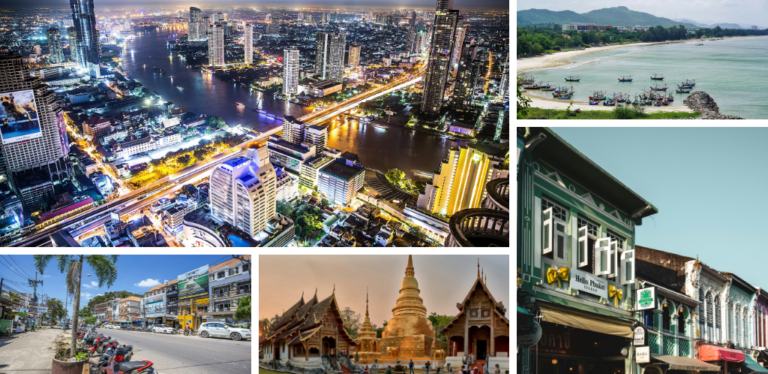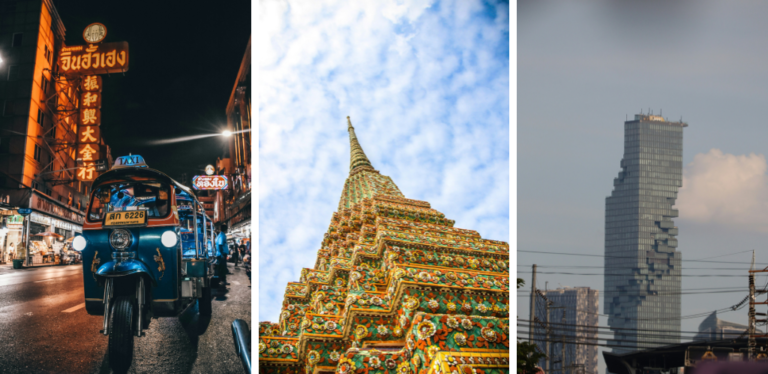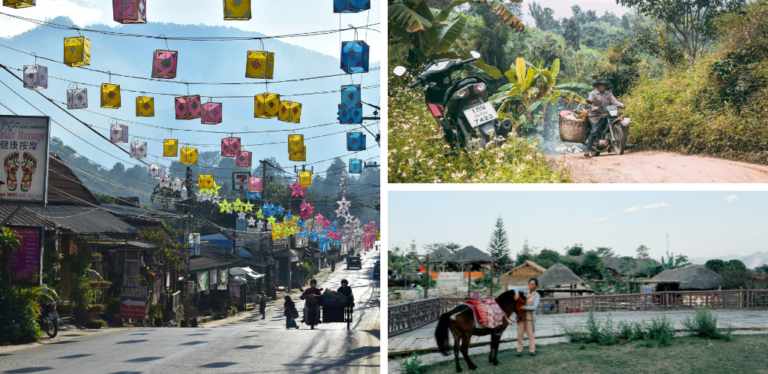Best Digital Nomad Cities in Thailand
Planning to spend some time in the land of smiles? Discover the five best cities in Thailand to live in if you are a digital nomad.
If there is one country that is on the radar of the nomad community, it is Thailand. It has earned the top spot as one of the favourite destinations for remote workers from all over the world. Not only for its low cost of living, but also for its culture, friendly people, stunning scenery and good infrastructure. If you are considering joining the many digital nomads who choose it as their base every year, this article is for you. We are going to tell you one of the most important things to know before you move: the best cities in Thailand to live in.
We will take a look at all the reasons that make this destination special. Also for details of all that the most popular cities in the land of smiles have to offer and for the most outstanding towns. Ready to discover the next place to set up your portable office?
Top 5 cities to live in as a digital nomad in Thailand

It’s easy to find your place in Thailand, with something for everyone. From the bustling capital to slightly more remote islands where you’ll have to rely on your Holafly eSIM to stay connected. However, they all have one thing in common: a friendly culture that you end up feeling part of.
In whichever city you choose, you’ll find affordable prices, delicious food, warm weather and, most importantly if you’re thinking of settling down to work remotely, plenty of spaces to work and connect with the nomad community. Each has its own personality and advantages. Let’s take a look at the five best cities to live in Thailand:
5. Hua Hin
We’ll start our list of Thailand’s best cities to live as a digital nomad with the small town of Hua Hin. Located south of Bangkok, it has become popular with expats and digital nomads looking for a quiet destination with good transport links. It takes just three hours to reach the capital and offers a combination of wide beaches, a relaxed atmosphere and an affordable cost of living. Although it does not have the same nightlife as Bangkok or Phuket, it offers a wide variety of outdoor activities and has a growing number of coworking spaces.
Hua Hin is ideal for those who want to live by the sea and work in a peaceful environment, without sacrificing the comforts of a small town.
Reasons why you’ll love living in Hua Hin if you’re a digital nomad:
- Internet connectivity and speed Hua Hin offers reliable connectivity, with speeds of 20-40 Mbps in coworking spaces and hotels.
- Variety of coworking spaces: coworking spaces in Hua Hin are growing in number. True Digital Park and One Faros are amongst the favourites for their professional atmosphere and additional services such as lounge areas and cafés.
- Affordable and flexible accommodation: in Hua Hin, rents are around 6,000 baht (about US$178) per month in central areas and close to the beach. There are also co-living options that offer furnished rooms and shared services.
- Cultural offerings: Hua Hin is known for its night markets, such as the Cicada Market. Also for attractions such as the Maruekhathaiyawan Summer Palace. In addition, the city has temples and beach areas where you can enjoy the Thai way of life.
- Weekend getaways: within easy reach of Hua Hin, you can visit the Sam Roi Yot National Park. Here you will find impressive rock formations and hidden beaches. Another option is Cha-am, a charming seaside destination.
4. Krabi Town
Krabi is a perfect choice for those looking to work remotely in a relaxed environment surrounded by nature. Located on the west coast of Thailand, it offers spectacular beaches, limestone cliffs and opportunities for adventure in the form of kayaking, hiking and climbing. Krabi is less touristy than Phuket, making it a quieter and more affordable destination, ideal for those who prefer a slower pace of life.
The nomad community in Krabi is small but growing. In areas like Ao Nang, you’ll find cafes and coworking spaces with good internet, as well as having nature on your doorstep – a source of inspiration for many remote workers. This balance between tranquillity and access to amenities makes Krabi an ideal base for nomadism.
Reasons to choose Krabi as a remote work base
- Internet connectivity and speed: although Krabi is a small town, its internet connection in areas such as Ao Nang and Krabi Town is reliable, with speeds of 20-30 Mbps in coworking spaces and cafes. This connectivity enables you to work hassle free on cloud office tasks and video calls.
- Variety of coworking spaces: Krabi has quiet and welcoming coworking spaces. The Garage, located in the centre, is a recommended venue with daily and monthly rates. In addition, in Ao Nang many cafes are equipped with good internet and offer a perfect environment to work in.
- Affordable and flexible accommodation: rents in Krabi are around 6,000 baht (about US$160) per month in the centre and Ao Nang, with co-living and shared accommodation options in central areas. Furnished accommodation with all basic amenities is available, ideal for long stays.
- Cultural offerings: Krabi has a very attractive cultural atmosphere. Among its landmarks are the Wat Kaew Korawaram Temple and the Ao Nang Night Market, where you can enjoy the local cuisine and Thai atmosphere. Local festivals also allow you to experience the culture in an authentic way.
- Weekend getaways: Krabi is an excellent base for exploring the region. Just a few kilometres away, you can enjoy the famous Railay Beach, known for its cliffs and tranquil atmosphere. Other nearby options include Tiger Cave, an ideal place for hiking and panoramic views of the city, and Klong Thom Hot Springs, perfect for relaxation.
3. Phuket Town
While it is true that Phuket is overrun by tourists, it also has a fairly large nomadic community. More and more remote workers are choosing it as their base. It is ideal for networking events and finding shared spaces. The cost of living is somewhat higher than in other cities such as Chiang Mai, but still affordable by Western standards. It is worth mentioning that in addition to Phuket town, there are many other interesting areas on the island ready to welcome remote workers, such as Rawai.
Why Phuket is one of the best destinations to live in Thailand:
- Connectivity and internet speed: in general, you will find good connectivity throughout the island. Most coworking spaces and accommodation have internet speeds of between 40 and 60 Mbps. The Patong and Kathu areas, in particular, are known for their reliable infrastructure, ideal for those in need of a stable connection.
- Variety of coworking spaces and coffee shops: finding coworking spaces and coffee shops to work in Phuket is easy. In the centre a good option is Graph Coffee. In Patong, Garage Society is one of the most popular spaces, with rates starting at 500 baht (US$15) per day. Another popular choice is Hatch in Rawai, which is noted for its social atmosphere and networking events.
- Affordable and flexible accommodation: In Phuket, rents are typically around 9,000 baht (about US$267) per month. A popular choice for nomads who choose Phuket as their base is Blu Monkey Hub and Hotel Phuket Town.HOMA too. If a co-living space is more to your fancy, Outsite Phuket has private rooms and integrated coworking areas. It makes for an environment very conducive to interaction with other nomads.
- Cultural offerings: the island has an interesting cultural side, with places such as Wat Chalong Temple, the largest temple in Phuket. Or the Phuket Vegetarian Festival, which attracts thousands of people every year. Old Phuket Town, in the centre, is also a recommended visit, with architecture influenced by Chinese and Portuguese cultures.
- Weekend getaways: from Phuket you can organise a variety of getaways. The Phi Phi islands, accessible by ferry, are ideal for a quick trip. Along with Coral Island, which is perfect for snorkelling. Another popular option is Phang Nga National Park, known for its limestone formations and caves.
2. Bangkok

There would be no point in listing Thailand’s best cities to live in without including its bustling capital. It offers not only a modern infrastructure, but also a cosmopolitan lifestyle full of contrasts. With many different neighbourhoods and plenty of historical sites to visit at your leisure, Bangkok is an exciting city to base yourself in. You can work in modern skyscrapers and explore traditional street markets just a few blocks away. It is also a good starting point for exploring other destinations in Asia.
The coworking and co-living scenes in the capital are booming. Although it has been overshadowed by what the number-one city has to offer (a city you will discover in just a few lines), it’s a popular place for digital nomads. Of you can plan to stay some days in Bangkok and see how things work!
What makes Bangkok special for digital nomads
- Connectivity and internet speed: it has modern infrastructure, with internet speeds in coworking spaces and hotels reaching 50 to 100 Mbps. In central neighbourhoods such as Sukhumvit and Sathorn, fast internet is easy to find in most cafés and coworking spaces, which is ideal for digital nomads who require constant connection.
- Variety of coworking spaces: there are coworking options for all tastes and budgets. The Hive is popular for its networking events and fees of 300 baht (just under $9) per day. At The Work Loft, near Silom, you can access meeting rooms and relaxation areas for 6,000 baht ($178) a month. In addition, True Digital Park in Sukhumvit is perfect for those looking for an innovative space.
- Affordable and flexible accommodation: the cost of rent in Bangkok varies, but in areas such as Sathorn and Sukhumvit you can find one-bedroom flats from 8,000 baht ($237) a month. There are also co-living options such as Lyf Sukhumvit 8, which combines accommodation and coworking in one place, ideal for nomads who want more convenience.
- Cultural offerings: Bangkok is a cultural centre full of tourist attractions, such as the Grand Palace and Wat Pho, which houses the famous reclining Buddha. Bangkok’s nightlife is very lively, especially on Khao San Road and RCA, where you will find international bars and restaurants.
- Weekend getaways: Bangkok is well connected to the rest of the country by domestic flights and bus and train services, which are not bad at all. You can take weekend trips to Ayutthaya, Thailand’s ancient capital. Another popular getaway for those who want to escape the tarmac and enjoy some peace and quiet are the beaches of Hua Hin.
1. Chiang Mai
And finally we come to number one! There’s no doubt about it, Thailand’s digital nomad city par excellence is Chiang Mai. This charming city in the north of the country is, in fact, known as the “capital of digital nomads”. If you search on digital nomad forums and other platforms specialising in this type of lifestyle, you will always find it at the top of the list of suggested destinations. And it is not difficult to understand why. It offers an ideal balance between a leisurely pace of life and excellent infrastructure for those working remotely.
The nomad community here is one of the largest in the world, with coworking spaces on almost every corner and cosy cafés offering good internet in a laid-back atmosphere. However, despite being a favourite with expatriates, Chiang Mai remains affordable. You will be able to enjoy a high quality of life without spending too much.
Why Chiang Mai is ideal for digital nomads
- Internet connectivity and speed: most coworking spaces and cafés in Chiang Mai offer fast and stable connections, reaching speeds of between 30 and 50 Mbps. The Nimmanhaemin and Old Town areas are known for their good digital infrastructure.
- Variety of coworking spaces: it boasts a wide range of coworking facilities, from affordable options to premium spaces. Punspace in Nimmanhaemin is a nomadic favourite, with rates starting at 600 baht (US$17.82) per day. Other popular options are Hub 53, ideal for co-living and coworking, or CAMP, a free space inside the Maya Mall, perfect for freelancers and students.
- Affordable and flexible accommodation: rents in Chiang Mai are quite affordable; in Nimmanhaemin you can find studios from 5,000 baht (about US$150) per month. In the old town, they are around 6,000-8,000 baht (US$178-237). There are also co-living options at Hub53, Alt_ChiangMai or The Social Club where you can rent rooms with integrated coworking services.
- Cultural offerings: “The Rose of the North” is noted for its cultural richness; it is home to temples such as the famous Wat Phra Singh and Wat Chedi Luang. In addition, the Lantern Festival (Loy Krathong and Yi Peng) is held every November, when thousands of lanterns light up the sky, a unique event that attracts people from all over the world.
- Weekend getaways: an excellent base for exploring northern Thailand. Just outside the city is Doi Suthep, a mountain ideal for hiking. A few kilometres away is the city of Chiang Rai, where you can visit the iconic White Temple. You can also go to the Golden Triangle, where Thailand, Laos and Myanmar converge.
Best towns to live as a digital nomad in Thailand

For those seeking an authentic Thai experience, the towns offer a quieter pace of life and the opportunity to connect more directly with nature and local culture. Although nomad communities are smaller, more and more people are choosing to settle there. Living in Thai towns has many advantages: the pace of life is slower, the cost of living is lower and you can get to know the country’s interesting culture much better. These are the five most popular towns among remote workers, some of Thailand’s best destinations to live in.
- Pai: Located in the northern mountains, Pai is known for its bohemian and relaxed atmosphere. This town is ideal for those seeking a quiet life and a creative community. There are more coworking cafés than coworking spaces. The Om Garden Cafe and The Pedlar are two good options, offering stable internet and a welcoming environment in which to work. In addition, Pai’s surroundings are full of hiking trails, waterfalls and natural hot springs, perfect for unwinding after a day’s work. The only thing wrong with Pai? The endless curvy road you’ll have to travel to get there.
- Koh Mak: this small island in the Gulf of Thailand is an ideal retreat for digital nomads seeking peace and nature. Without the hectic nature of the more touristy islands, Koh Mak has good coworking facilities, such as the Koh Mak Campus. Life here is simple, with affordable accommodation and a leisurely pace that allows you to balance work and personal well-being.
- Sukhothai: famous for its historical park, Sukhothai is ideal for those seeking a cultural and less touristy environment. Although small, it has quiet cafés where it is possible to work with a stable connection. Here, nomads enjoy an authentic environment, surrounded by ancient ruins and temples, which create an inspiring and unique atmosphere for creative work.
- Kanchanaburi: on the banks of the River Kwai, this town is perfect for those who want to combine history and nature. Known for its famous bridge and World War II museums, Kanchanaburi has a growing nomad community. Cafes such as The Bridge Cafe are popular with those looking for a quiet environment to work in, while enjoying the view of the river.
- Chiang Dao: a quiet mountain town north of Chiang Mai, ideal for nomads seeking serenity. Chiang Dao is famous for its caves and natural environment, where you can work surrounded by mountains. Some co-living spaces in the area offer stable internet and an experience of living in direct contact with nature.
Important: If you are a frequent traveler and want to stay connected without worrying about expensive roaming or looking for a new SIM at every destination, Holafly’s subscription plans are for you. With a single eSIM, enjoy internet in more than 170 countries for a fixed price and no surprises on your bill. Travel without limits and connect easily and securely! 🚀🌍

Why live as a digital nomad in Thailand?
After this tour of Thailand’s best cities to live in and the best towns, you’ll realise how easy it is to find a place that suits your needs or tastes in the country. In addition, as a digital nomad in Thailand, you can enjoy an active community, an infrastructure for uninterrupted work and plenty of activities to unwind after work. Let’s take one last look, this time at what Thailand has to offer, so you can decide if it’s the perfect destination for you.
Benefits of living as a digital nomad in Thailand!
- Affordable cost of living: living in Thailand is cheaper than in many other destinations for digital nomads. Rent in cities like Chiang Mai can cost between 5,000 and 10,000 baht (US$150-300) a month, while eating at local restaurants is affordable, with delicious dishes for 50-100 baht (US$1.50-3).
- Infrastructure for working remotely: in major cities, internet connectivity is reliable and coworking facilities are widely available, which facilitates the day-to-day work of remote workers. Spaces like True Digital Park in Bangkok or Hub 53 in Chiang Mai are designed for digital nomads looking for productive and flexible environments.
- Digital Nomad Visa Thailand has developed a specific visa for digital nomads, known as the LTR (Long Term Resident) visa, which allows highly skilled professionals and remote workers to live in the country for an extended period. This visa facilitates a more stable stay and allows the option of applying for an accompanying family member visa, which is ideal for those seeking long-term settlement.
- High-quality health and medical care: Thailand has quality and affordable healthcare, with hospitals and clinics renowned for their high standard of care, especially in cities such as Bangkok and Chiang Mai. Still, as in any other destination, it is important to take out good travel insurance to ensure adequate cover in case of emergencies. If you are staying for a long time, there are also good insurance options for foreigners in Thailand.
- Nomad community on the rise: Thailand has a very active nomad and expatriate community. You can meet people from all over the world at networking events, and coworking and co-living spaces, creating a network of contacts that can open doors to new professional opportunities and collaborations.
- Culture and safety: the friendliness of the Thai people is well known and the country is more than safe for expatriates. This welcoming environment makes it easy to adapt to the local lifestyle, enjoy Thai culture and live peacefully, whether in urban areas or in natural surroundings.
- Leisure and nature opportunities: a work-life balance is easy to maintain in Thailand. You can work from a coworking space during the day and explore temples, beaches, markets and nature parks at the end of the day. From hiking in Chiang Mai to scuba diving in the southern islands, you’ll always find something new to do here.
Frequently asked questions when choosing the best city to live as a digital nomad in Thailand
Chiang Mai tends to be a favourite due to its low cost of living and large selection of coworking spaces and accommodation. In Nimmanhaemin, one of the most popular areas, you can rent a studio from 5,000 baht (about US$135) per month, while in Punspace, one of the most popular coworking spaces, monthly rates are around 5,500 baht (US$148).
Living in Thailand as a digital nomad can cost between 26,000 and 45,000 baht ($700-1,200) per month, depending on the city and lifestyle. Bangkok, one of Thailand’s best cities to live in, is often more expensive
Thailand belongs to the list of 42 countries that have a special visa for digital nomads. However, depending on your circumstances, you may be eligible for a different type of visa. Options include the Destination Thailand Visa (up to 180 days), the SMART Visa (6 months to 4 years for skilled professionals) and the Long-Term Resident Visa (up to 10 years for those who satisfy high financial requirements). There are also options such as the Tourist Visa (60-90 days) and the Elite Visa (5 to 20 years, with VIP benefits).
Prices in Bangkok depend on location. The Hive offers daily rates from 300 baht (US$8) and monthly plans from 6,000 baht (US$162). True Digital Park, in Sukhumvit, is another popular option with memberships starting at 5,000 baht (US$135) per month.
Yes, there are many options for co-living and monthly rentals in Thailand. In Chiang Mai, one of Thailand’s best cities to live in, furnished studios start at 5,000 baht (US$135). On islands such as Koh Lanta, some co-living spaces such as KoHub integrate accommodation and coworking.
November to February is the best time to live in Thailand, when the weather is dry and cooler. It is best to avoid the rainy season, from June to October, especially if you plan to be on islands and around coastal areas.





 Language
Language 


















 No results found
No results found


